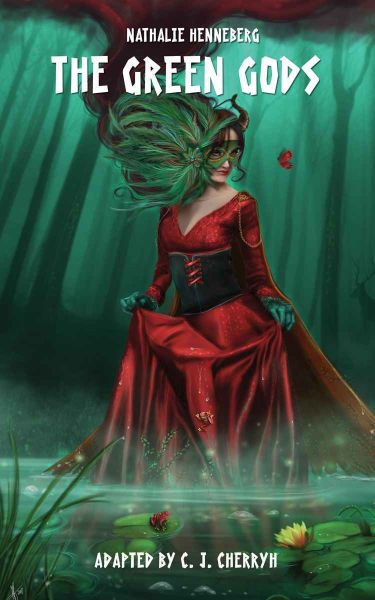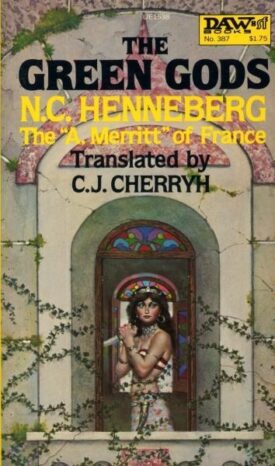Green Grass of Home
The Green Gods
By Nathalie Henneberg

1 Dec, 2021
0 comments
Nathalie Henneberg’s 2010 The Green Gods collects the 1980 English adaptation of Henneberg’s Les dieux verts, as well as four other short pieces. The Green Gods was translated1 by C. J. Cherryh. The other stories were translated by Damon Knight.
Early editions of Henneberg’s work gave credit to her husband. After his death in 1959, that fiction was abandoned. I’ve edited the credits I cut and pasted from ISFDB to reflect the actual authorship rather than the attributed one.
I went looking for this because SF Ruminations tweeted the cover of the 1980 DAW edition.

I am sure I would have picked this book up had I seen it in 1980. Too bad that I didn’t. I looked for it online and discovered that, despite the generally huge print runs typical of those days, it was unavailable. However, there is a much more recent edition that also includes material the DAW does not appear to have contained. I’m reviewing the later edition.
If one didn’t look at the copyright date, one might guess that the stories were a decade or two older than they actually are. It may be no coincidence that the author to whom the cover of the DAW edition compared Henneberg was A. Merritt, whose heyday was in the second fifth of the 20th century, rather than some more recent author.
The stories are energetic, with a creative approach to science. Don’t expect modern views, particularly where the disabled are concerned.
I am happy enough to have encountered the author and her vivid space fantasies without being left with any great desire to seek out more of her work. Admittedly, if I could read French my opinion might be different, but I’ve no reason to think the translations are unfaithful to the source material.
The Green Gods is available here (Amazon US), here (Amazon Canada), here (Amazon UK), here (Barnes & Noble), here (Book Depository), and here (Chapters-Indigo).
As for the contents:
Introduction (The Green Gods) • essay by Charles Moreau
A short biography of the author, and where appropriate, her husband, both of whom had the sort of exciting lives made possible by thrilling events in Eurasia in the 20th century. Nathalie Henneberg’s life, for example, took her from the Russian Empire to the Middle East to France, while her German-born husband Charles fought for both Vichy and Free French during WWII.
The Green Gods • (1980) • novel by Nathalie Henneberg (trans. of Les dieux verts 1961)
An unexplained calamity sank most continents and surrounded greenhouse Earth in an impenetrable magnetic field. The embargo lasted for thousands of years. Intelligent plants took advantage of the opportunity to slowly, inexorably debase the humans of the last remaining significant human nation, A‑atlan.
Prince Aran would like to marry Queen Atlena without being subsequently murdered (a rites forced on them by the plants, who want humans to adopt the ways of social insects). He would like to liberate all of A‑atlan’s humans from the plant domination. Alone, he is unlikely to succeed. Indeed, if the plants have anything to say about it, his odds of survival are quite poor.
However, not only is Aran courageous and ingenious, there are mutated humans with whom he might ally. Further, the magnetic field that cuts Earth off from its extrasolar colonies is weakening. Earth’s children may save Earth’s humans … if they can somehow be convinced the goal is worth the cost.
The science in this is dubious (to put it kindly) but no more implausible than its contemporary, Brian Aldiss’ Hothouse.
The Non-Humans • (1958) • novelette by Nathalie Henneberg (trans. of Les non-humains)
A Renaissance man smitten with a beautiful maiden is outraged by suggestions that she is only a mechanical doll, operated by a man who may or may not be the Wandering Jew. Determined to discover the truth, he does not ask himself if he would be happy with the answer.
“The Blind Pilot” • short story by Nathalie Henneberg (trans. of “Au pilote aveugle” 1959)
Despite Jackie’s best efforts to save his friend North, the former starman falls prey to a menace he could have resisted were he not blind.
This story reminds me of C. L. Moore’s Shambleau, which featured a guy named Northwest falling prey to an alluring alien menace. Not because Northwest was blind, but because he refused to see.
This tale is off-handedly ableist: everyone looks down on Jackie because Jackie is a disabled mutant. People are so certain of Jackie’s position in the pecking order that they consign Jackie to a life of avoidable poverty and squalor; they don’t feel malice so much as a sense that this is just the way things have to be.
“Moon-Fishers” • (1959) • short fiction by Nathalie Henneberg (trans. of “Pêcheurs de lune”)
A time traveler becomes entangled with the humans and gods of ancient Egypt, despite having been warned not to underestimate the beings of the past. Not only are the ancients of this interesting time period not startled by time travellers, the ancients’ plans take time travellers into account.
“Ysolde” • (1968) • short story by Nathalie Henneberg (trans. of “Ysolde” 1960)
A woman researcher’s efforts to save her husband from an entity encountered on an alien world ends in tragedy.
Bibliography (The Green Gods) • essay by uncredited
What it says on the tin.
1: The text actually says “adapted.” I am not clear what the difference between adapted and translated is.
